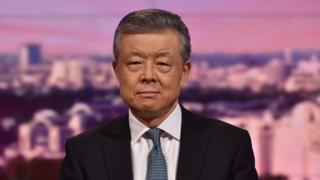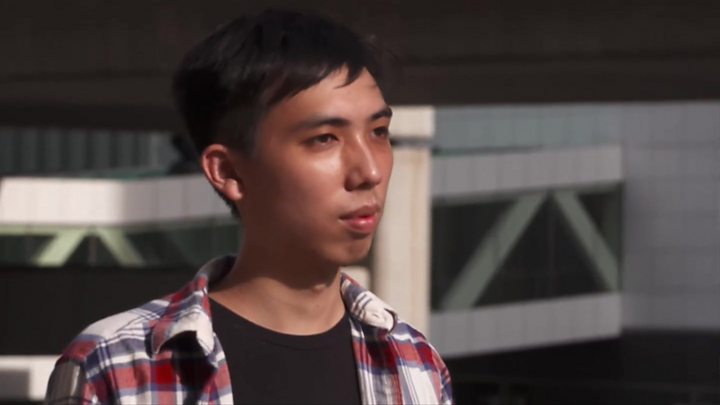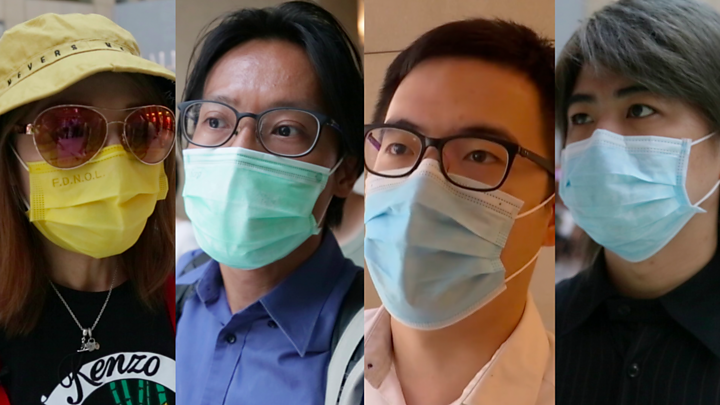 Image caption
Ambassador Liu Xiaoming said the UK had made "irresponsible remarks"
Image caption
Ambassador Liu Xiaoming said the UK had made "irresponsible remarks"
China has warned the UK not to interfere with Hong Kong following the imposition of a new National Security Law, as one pro-democracy campaigner begged for international support.
Ambassador Liu Xiaoming said the UK's offer of a path to citizenship for up to three million Hong Kongers amounted to "gross interference".
The offer came after Beijing brought in the controversial and sweeping new law.
Opponents say it erodes the territory's freedoms as a semi-autonomous region.
Activist Joshua Wong had earlier called for more support, asking his fellow Hong Kongers and the wider world not to "kowtow" to Beijing.
But Ambassador Liu said he hoped the UK would reconsider its offer.
"The UK government keeps making irresponsible remarks on Hong Kong affairs," he told reporters.
The ambassador said a decision on exactly how Beijing intended to respond to the offer would be made once it knew the details.
The UK has argued that China has reneged on an agreement made in 1997, which offered certain freedoms to Hong Kong for 50 years in return for handing the territory back to Beijing.

Media playback is unsupported on your device
Later on Monday, a spokesman for UK Prime Minister Boris Johnson urged China not to interfere if Hong Kongers with British National (Overseas) status sought to come to the UK.
"We would expect China to understand the importance of adhering to international law," the spokesman said.
He added: "We are currently assessing the National Security Law and its legal ramifications in terms of extradition with Hong Kong.
"There are already extensive extradition safeguards in the UK. The courts are required to bar a person's extradition to any country if it would be incompatible with their human rights or if the request appears to be motivated by their political opinion."
Hong Kong's new security law
Also on Monday, Facebook and its messaging service WhatsApp said they had "paused" processing requests for information from the Hong Kong government and law enforcement agencies "pending further assessment of the impact of the National Security Law".
The assessment will include "formal human rights due diligence and consultations with human rights experts", according to a statement.
Image copyright Reuters Image caption Joshua Wong, centre, appeared in court with fellow activists Ivan Lam and Agnes ChowNumerous other countries, including the US, Canada, Japan and Australia, have also expressed concern over the imposition of the law.
The new law, which was brought in last week, targets secession, subversion and terrorism with punishments of up to life in prison.
Opponents like Mr Wong say it effectively ends freedom of speech. Beijing rejects this.
Mr Wong, who appeared in court on Monday with two other activists charged with illegal assembly, said the law was already having a chilling effect.
Over the weekend, books by pro-democracy activists were removed from public libraries.

Media playback is unsupported on your device
But Mr Wong was determined to keep fighting.
"We know now it's an uphill battle, but no matter we have our friends in the global community continue their international advocacy," he told reporters outside court.
"In Hong Kong, we still urge people to vote in the upcoming primary election scheduled on this weekend.
"We also encourage more people in Hong Kong or in the global community to continue to let Beijing aware [sic] that to kowtow to China is not an option and we must stand up and fight."
What is the security law?
The law is wide-ranging, and gives Beijing powers that it has never had before to shape life in Hong Kong. The law makes it an offence to incite hatred of China's central government and Hong Kong's regional government.
It also allows for closed-door trials, wire-tapping of suspects and the potential for suspects to be tried on the Chinese mainland.
Acts including damaging public transport facilities - which often happened during the 2019 protests - can be considered terrorism.
There are also concerns over online freedom as internet providers might have to hand over data if requested by police.

 5 years ago
789
5 years ago
789 

